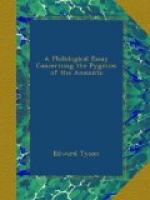them into line with the science of his day. Hence
the “Philological Essay” with which this
book is concerned. There are no pigmy races,
he says; “the most diligent enquiries of late
into all the parts of the inhabited world could never
discover any such puny diminutive race of mankind.”
But there are tales about them, “fables and
wonderful and merry relations, that are transmitted
down to us concerning them,” which surely require
explanation. That explanation he found in his
theory that all the accounts of pigmy tribes were based
upon the mistakes of travellers who had taken apes
for men. Nor was he without followers in his
opinion; amongst whom here need only be mentioned Buffon,
who in his
Histoire des Oiseaux explains the
Homeric tale much as Tyson had done. The discoveries,
however, of this century have, as all know, re-established
in their essential details the accounts of the older
writers, and in doing so have demolished the theories
of Tyson and Buffon. We now know, not merely
that there are pigmy races in existence, but that
the area which they occupy is an extensive one, and
in the remote past has without doubt been more extensive
still. Moreover, certain of these races have
been, at least tentatively, identified with the pigmy
tribes of Pliny, Herodotus, Aristotle, and other writers.
It will be well, before considering this question,
and before entering into any consideration of the
legends and myths which may possibly be associated
with dwarf races, to sketch briefly their distribution
throughout the continents of the globe. It is
necessary to keep clearly in view the upper limit which
can justly be assigned to dwarfishness, and with this
object it may be advisable to commence with a statement
as to the average heights reached by various representative
peoples. According to Topinard, the races of the
world may be classified, in respect to their stature,
in the following manner:—
Tall 5 ft. 8 in. and upwards.
Above the average 5 ft. 6 in. to 5 ft. 8 in.
Below the average 5 ft. 4 in. to 5 ft. 6 in.
Short Below 5 ft. 4 in.
Thus amongst ordinary peoples there is no very striking
difference of height, so far as the average is concerned.
It would, however, be a great mistake to suppose that
all races reaching a lower average height than five
feet four inches are, in any accurate sense of the
word, to be looked upon as pigmies. We have to
descend to a considerably lower figure before that
appellation can be correctly employed. The stature
must fall considerably below five feet before we can
speak of the race as one of dwarfs or pigmies.
Anthropometrical authorities have not as yet agreed
upon any upward limit for such a class, but for our
present purposes it may be convenient to say that
any race in which the average male stature does not
exceed four feet nine inches—that is, the
average height of a boy of about twelve years of age—may
fairly be described as pigmy. It is most important
to bear this matter of inches in mind in connection
with points which will have to be considered in a
later section.




